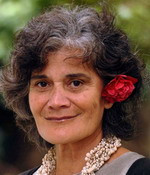The recently published HRC-funded research into traumatic brain injury (TBI) within Pacific people of Aotearoa is ground breaking for Pacific according to one of the study’s authors, Tagaloatele Professor Peggy Fairburn Dunlop.
“This is a highly significant research for Pacific peoples, in terms of the data. It shows how horrendous our stroke statistics are. While the other major first for this project was the approach it took – it is ground breaking,” Tagaloatele tells Pacific Guardians.
She explains that in the past, the majority of medical (and other) research were conducted by treating the population as one group. It means results of those former studies did not take into account the differences of experience that would be unique to different ethnic groups.
“The Pacific story is different from the mainstream story,” says Tagaloatele. “And this study took the first step of ensuring there was a Pacific sample within the total study, which then disaggregated and interpreted the data.”
Head author, Senior Research Fellow, Alice Theadom agrees with Tagaloatele in an email response to Pacific Guardians.
“As Peggy suggested, this study highlights the importance of looking at how injuries affect different ethnic groups within New Zealand so that we can develop targeted prevention strategies to reduce the number of injuries that occur in the future.
“We were very keen that the study had a Pasifika focus and therefore as part of this project we wanted to look at the frequency brain injuries were occurring for Pasifika in comparison to New Zealand Europeans as well as how injuries were being sustained to help inform prevention strategies.”
The project, conducted by a fourth year Pasifika physio student, formed part of a larger study that identified all cases of traumatic brain injury that occurred in the Hamilton and Waikato regions of New Zealand over a one year period.
“The project revealed that the incidence of traumatic brain injury was far higher in Pasifika (1242 per 100,000) when compared to NZ Europeans (842 per 100,000),” Ms Theodom confirms to Pacific Guardians.
“Injuries were also sustained at a younger age by Pasifika. Peaks in incidence were observed in 0-4 year olds and 15-24 year olds with injuries most commonly caused by falls or being hit by an object.”
Ms Theodom says that placing the data in context show most of the injuries “were sustained during sports and recreational activities and activities of daily living.”
It means the information will help the development of targeted prevention strategies to reduce the number of injuries in the future.
She adds the study also highlighted the “importance of raising awareness of brain injury and the responsibility we all have as members of our society to look out for people who have experienced a hit to the head and who feel dazed and confused afterwards to ensure that they seek medical attention and get the support they need to make an optimal recovery.”
For Tagaloatele, there two significant outcomes of the project for Pasifika were the isolation of Pacific as a research population group; and the use of “Pacific researchers” in the project.
“This Pacific picture [from the study] is important to our Pacific communities as it emphasizes what we need to do as too many Pacific people are suffering from stroke.
“It is also highly important data for health sector planning as it highlights that no one programme fits all. It means that health programmes, such as those for stroke, can now be tailored to Pacific as data are now becoming available.”
Tagaloatele adds, “My hopes are that the way this study was carried out, the inclusion of Pacific peoples and Pacific researchers, becomes the model for other medical research.”
Pacific peoples involved in the study:
Wesley Lagolago: Research Assistant, National Institute for Stroke and Applied Neurosciences, AUT University, Auckland. Mr Lagolago was the recipient of a 2014 HRC Pacific Health Summer Studentship Career Development Award for his project 'Understanding traumatic brain injury in the Pasifika population of New Zealand'.
Alice Theadom: Senior Research Fellow, National institute for Stroke and Applied Neurosciences, AUT University, Auckland.
Tagaloatele Professor Peggy Fairbairn-Dunlop: Professor of Pacific Studies, Institute of Public Policy, AUT University, Auckland.
Shanthi Ameratunga: Professor of Epidemiology, Section of Epidemiology & Biostatistics, School of Population Health, the University of Auckland.
Braden Te Ao: PhD Student and Māori Health Researcher, National institute for Stroke and Applied Neurosciences, AUT University, Auckland.
Article by Lealaiauloto Aigaletaulealea F. Tauafiafi.
Source: Pacific Guardians |Pacific Perspectives from Aotearoa
